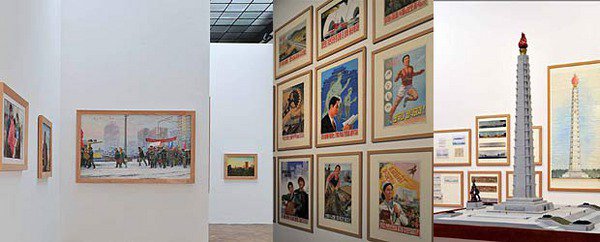Flowers for Kim Il Sung
dal 17/5/2010 al 4/9/2010
Segnalato da
17/5/2010
Flowers for Kim Il Sung
MAK Austrian Museum of Applied Arts / Contemporary Art, Wien
Art and architecture from the Democratic People's Republic of Korea

Exhibition: Peter Noever / Curator: Bettina M. Busse
Consultant Curator: Christiane Bauermeister / Project Coordination: Dunja Gottweis
For the first time worldwide, the art of the Democratic People’s Republic of Korea (DPRK) will be shown—in great breadth—outside of the country: the 100 exhibited pieces include, in addition to water colors and posters, numerous large-format oil and ink paintings.
It is time to bring these works, together with their contexts, closer to a Western audience, and provide a well-founded base for knowledge about art in the DPRK. The idea is to set in motion perception and reflection processes that operate beyond familiar patterns. Only those who dialectically confront other cultures can gain understanding of their own.
Focus is on contemporary art production, more than half of the works are from the past decade. As an introduction to contemporary art of the DPRK, the show grants extensive insight into the largely foreign world beyond the 38th parallel.
After the end of Japanese colonial rule (1945), and especially since the late 1950s, national independence has been the primary state doctrine of the DPRK, and also the central canon of artistic production. State founder Kim Il Sung gave Marxism-Leninism a special imprint; his Juche ideology, which has transformed "socialist realism" in art since the early 1960s, propagates the autonomy of the DPRK in ideological, political, economic, and military terms.
In his treatise "On Architecture," Kim Jong II postulated architecture as a will to order the entire (urban) space by means of programmatic structures that fuses state and society, and—aesthetically—politicizes, representing specific Juche pedagogic messages.
From pictures of people through to everyday scenes and patriotic depictions of the landscape: art from the DPRK sketches out an ideal. In general, the works presented are official, state politics supporting art whose essence was defined by the "Eternal President" Kim Il Sung as socialist content reflected in national form. This art is realistic, class-conscious, revolutionarily-minded, aiming at understandable messages (in the spirit of Juche), mainly large-format, and colorfully optimistic; it is also dramatic, critical of "Western modernism", close to the people in form and content, collective (group works, for example, are given key significance), and socially homogenizing. Juche art combines socialist contents with national forms.
Also fifteen portraits of Kim Il Sung and Kim Jong Il will be shown for the first time outside of the DPRK. The works present the two leaders in extremely diverse situations, but in most cases, close to the people (for example, together with factory workers, soldiers, farmers, or children). Legendary scenes from the life of Kim Il Sung, who seems to be omnipresent, illustrate the path to national independence.
Architecture in the DPRK is presented in its ideal form based on the architecture of Pyongyang; mainly, a model of the Tower of Juche Idea, the city’s landmark, as well as a selection of drawings and architectural photos of outstanding individual structures, such as the May Day Stadium and the ice rink.
Under the leadership of President Kim Il Sung, who transformed the theoretical superstructure into concrete practice, a metropolis arose, conceived as a Gesamtkunstwerk, in a seemingly modern aesthetics arose from the ruins of the Korean War (1950–1953) in the briefest time imaginable: a model city representing the nation in ideological, technological, as well as cultural aspects. Everywhere in the world, state capitals are given the job of transporting state politics; however, with its overly-determined city picture, Pyongyang can nearly be characterized as a Juche manifesto.
No least due to its great concentration of memorials, Pyongyang appears as though a monumental open-air museum for public art. Striking sacral structures are e.g., Kim Il Sung’s gigantic mausoleum, the Chollima statue, or the Arch of Triumph. Broad boulevards, huge squares, enormous public structures (e.g., Grand People’s Study House), a lot of art in public space (e.g., the artistically designed subways with their marble, mosaics, and paintings), numerous theaters and museums, etc.—all of this is, so to speak, property of the people and designated for public use.
The works posed for discussion illuminate a political system that stands in clear contrast to the Western social structure. "Flowers for Kim Il Sung" can thereby be found in the tradition of MAK exhibitions, such as "Art and Revolution. Russian and Soviet Art 1919–1932" (1988), "The Tyranny of the Beautiful. Architecture in the Time of Stalin" (1994), "Architecture Again. The Havana Project" (1997), and "Cine Art. Indian Poster Painters in the MAK" (1999).
The exhibition was prepared in collaboration with the Korean Art Gallery and the Paektusan Academy of Architecture, both in Pyongyang.
All loans courtesy of the Korean Art Gallery and courtesy of the Paektusan Academy of Architecture.
Exhibition Management: Sabrina Handler / Exhibition Design: Michael Embacher
The exhibition is accompanied by the catalogue "Flowers for Kim Il Sung. Art and Architecture from the Democratic People's Republic of North Korea", edited by Peter Noever, with contributions by Han Chang Gyu, Frank Hoffmann, Peter Noever.
Image: Exhibition views
Press and PR Monika Meryn (Press chief), Olivia Harrer, Christiane Vogl phone (+43-1) 711 36-229 fax (+43-1) 711 36-227 presse@MAK.at
Press Preview Tuesday, May 18, 2010, 10:30 a.m.
Opening Tuesday, May 18, 2010, 8 p.m.
MAK – Austrian Museum of Applied Arts / Contemporary Art
Stubenring 5, 1010 Vienna, Austria
Opening hours:
10.00 a.m.-12.00 p.m.
Wed-Sun 10.00 a.m.-6.00 p.m.
Mon closed
Admission:
€ 9,90 including MAK Guide
€ 7,90 / reduced € 5,50
Free admission for children and teens up to 19, the unemployed and student groups accompanied by teachers.
Tour contribution € 2,00
Free admission on Saturdays



